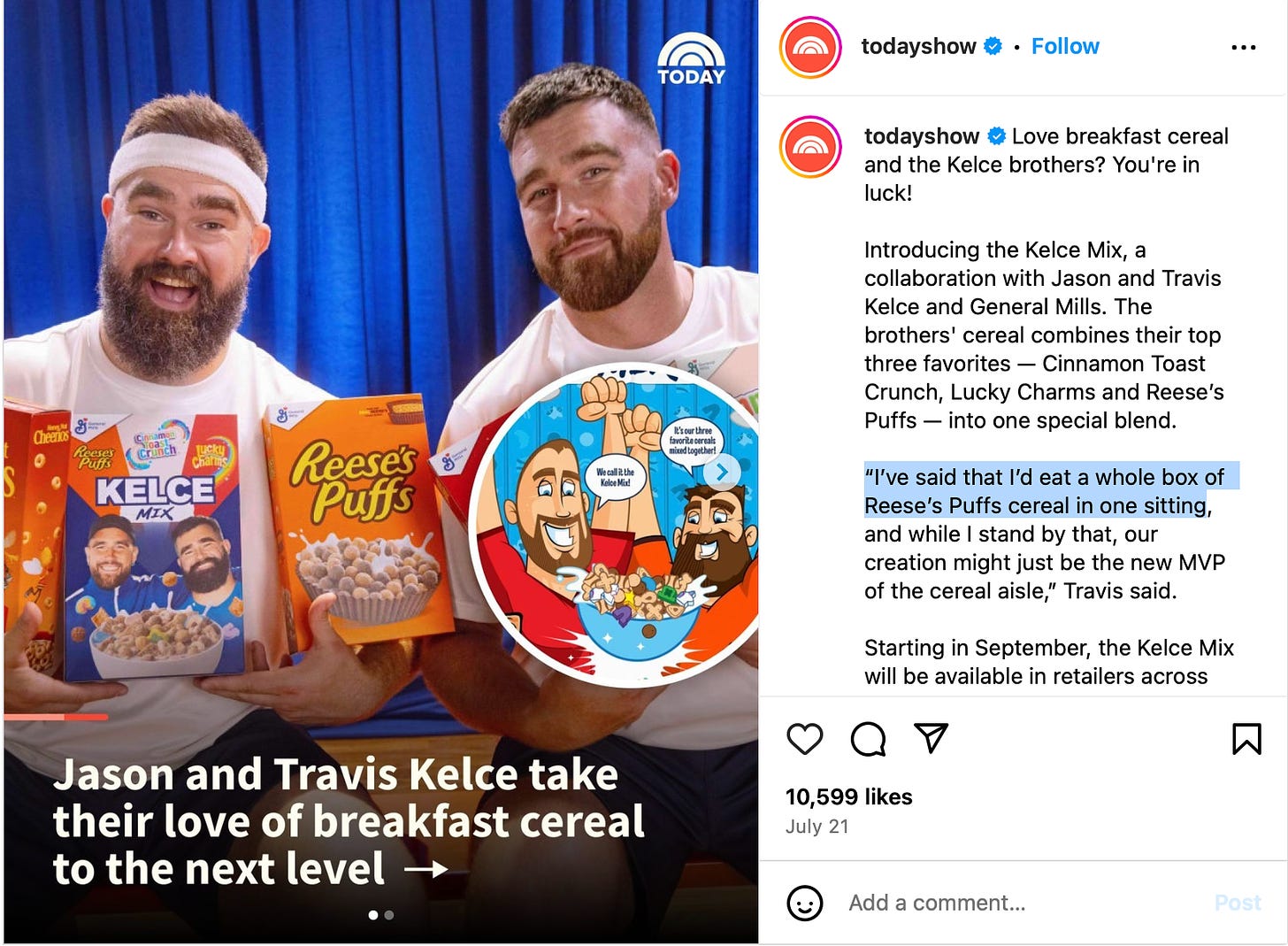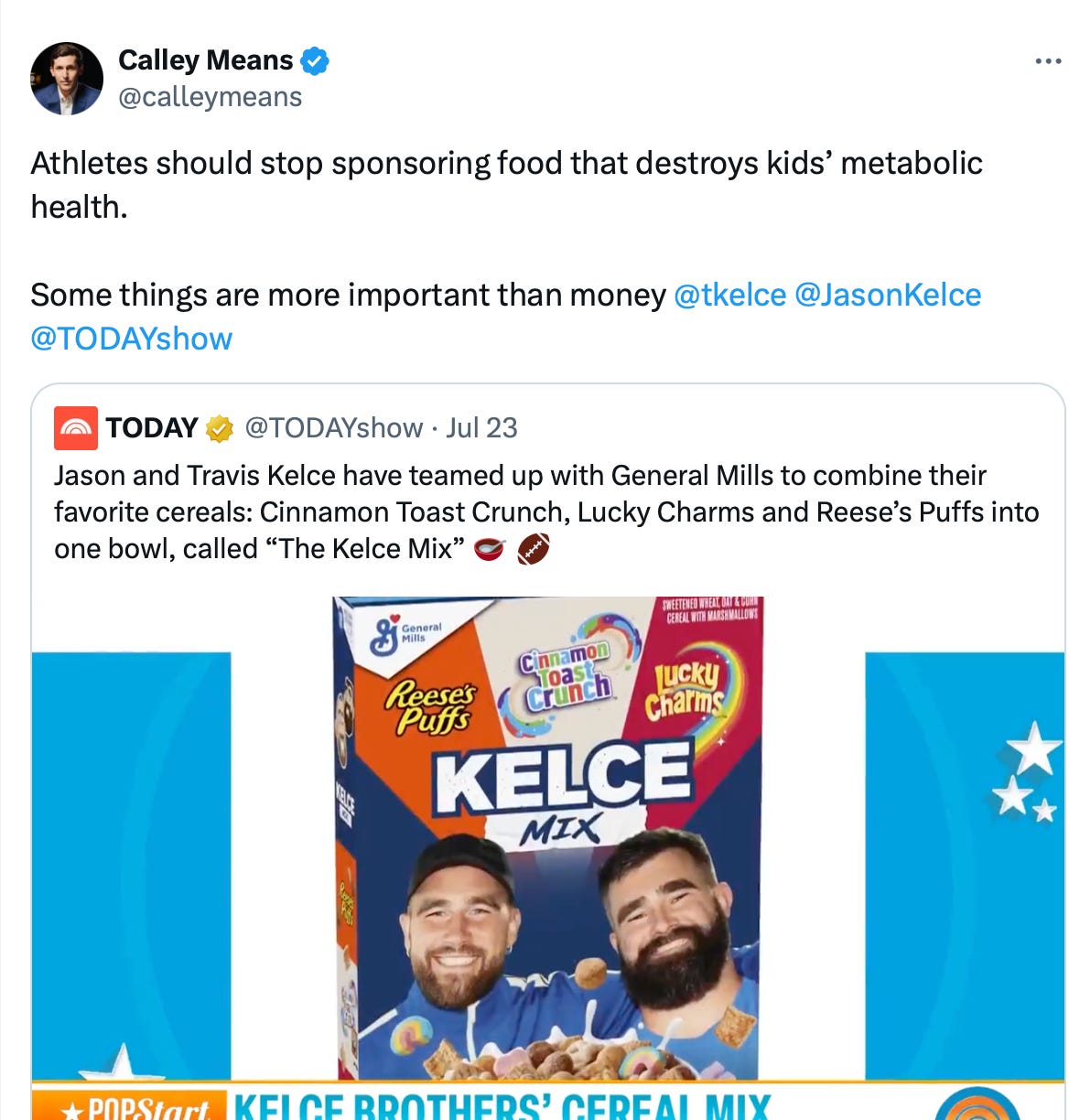Kelce Brothers’ Cereal Triad Destroys Metabolic Health
Much like I used do with chocolate milk over Cinnamon Toast Crunch as a child, I want to pour my input on to the current Kelce Brothers’ Controversy.
Much like I used do with chocolate milk over Cinnamon Toast Crunch as a child, I want to pour my input on to the current Kelce Brothers’ Controversy.
If you haven’t been following, Jason Kelce is a former member of the Philadelphia Eagles, and his brother Travis Kelce plays for the Kansas City Chiefs. Both are highly regarded NFL players with impressive football resumes, or so Wikipedia tells me.
Recently, they launched a cereal line – available for purchase in September – composed of their favorite cereals: Reese’s Puffs, Cinnamon Toast Crunch, and Lucky Charms.
General Mills is marketing this product with statements like this one from Brandon Tyrrell, senior manager of brand experience at General Mills: “You can now eat and train like the Kelce brothers.”
And Travis himself encouraged, “I’d eat a whole box of Reese’s Puffs cereal in one sitting…” (vis-à-vis Today show’s Instagram account).
More to the point, the controversy exploded last week in the wake of an exchange between Calley Means and Jason on Twitter that went as follows:
Calley: “Athletes should stop sponsoring food that destroys kids’ metabolic health. Some things are more important than money.”
Jason: “I grew up on these products Calley, and I was a perfectly healthy fit child, because I enjoyed them in moderation and when on the go for quick meals when both my parents didn’t have time to cook. I appreciate you spreading information on what is healthy for people and kids, and I take the obesity epidemic as a country and for kids seriously, but there is also room to eat cereal and ice cream and candy in the right quantities in conjunction with a healthy lifestyle.”
Calley: “Jason - moderation isn't working.”
Dozens of news outlets have chimed in.
On this matter I have thoughts that I will choose to share through three lenses, those of:
(i) my childhood
(ii) a patient
(iii) a scientist.
Lens of my childhood
Jason shared his perspective that he was a “perfectly healthy fit child, because I enjoyed the[se cereals] in moderation … there is also room to eat cereal and ice cream and candy in the right quantities in conjunction with a healthy lifestyle.”
I can appreciate Jason’s position. I myself – throughout childhood – was apparently healthy and athletic, and lived a relatively care-free life inclusive of (enhanced by?) breakfast cereal, including those preferenced by Jason and Travis.
In a typical day, I could eat a whole box of cereal (game appreciates game, Travis).
I also indulged in ice cream, routinely, and even enjoyed Dartmouth’s chocolate chip cookies (kept gooey and cozy under a heat lamp at the dining hall) so much I gave them a hat tip in my valedictory address at commencement.
I’d be a hypocrite to pretend I didn’t live a childhood similar to that Jason and Travis, although I do appreciate the size discrepancy: each brother has twice my body mass, or more. I wonder if the insulin bump from Reese’s facilitated this growth. Hmm.
Nevertheless, my main point is as follows: when you live a life privileged to be free of metabolic disease, there’s no reason to challenge the enticing narrative that “moderation is key” and that these foods (sugary cereals, candy, ice cream) can and should be enjoyed in moderation as part of a balanced lifestyle.
And some may get away with this approach. But not all do. It’s a roulette wheel. And how long will you keep spinning?
Lens of a Patient
For those who don’t know me, my life took a hairpin turn at the end of college and beginning of graduate school at Oxford where – despite an outwardly healthy appearance (by which I largely mean ‘normal’ BMI) – I began suffering from inflammatory bowel disease (IBD).
To what extent the “in moderation” Westernized diet I consumed throughout my childhood lay the groundwork for my IBD I cannot say for certain. That said, I think it’s reasonable to assume that a constant stream of processed food – even if added beyond my “five-a-day” and “sufficient protein” and hitting all my micronutrient RDAs – did me no favors, at the very least.
But what I can say, with confidence, is that cutting out the category of foods I’ll here call the “Kelce-approved-in-moderation” (sorry brothers) was necessary for my recovery. Only through elimination of all sugar and processed carbohydrates in my diet did my disease go into clinical and histological remission.
Through my n = 1 journey, combined with what I’ve seen clinically during my subsequent years in medical school and through clinical extracurriculars and through simple cultural observation, I am convinced that Calley is largely right: moderation is not working.
Moderation is “normal.”
But Eat a Normal Standard American Diet and you will get Normal Standard American Results.
And who wants that?
Lens of a Scientist
I mean no offense when I say the Kelce brothers aren’t academics. Jason himself admits “The only thing Travis and I know more about than football is cereal.” But let’s acknowledge that as a premise for what I’m about to share, since their “clap back” (if it comes) will not be informed by experience or deep exposure to metabolic health sciences. I think that’s fair framing.
With that, I’ll say that as I have delved into the literature on the sorts of foods they are promoting, I’ve been shocked by the depth and complexity of damage these foods can have on our bodies.
At this point, I could wax eloquent – citing top basic science journals – about the impact of specific ingredients on the microbiome, adipocytes, insulin resistance, various brain circuits, and so on. And I could try to weave together these datapoints into a matrix resembling that which I see in my minds eye. But I’m not sure I have the vocabulary, nor would most readers to patience to bear with me through all of that.
So, instead, I’ll pose a few simple observations and ask you – like a science – to evaluate hypotheses.
The observations are:
The messages of “moderation” and “balance” have been core to dietary recommendations for decades.
Despite these messages, the metabolic health epidemic – including of the obesity and mental health epidemics – have gotten progressively worse.
Elimination of “Kelce-approved-in-moderation” foods has shown promise clinically for the treatment, not only of obesity, but for a broad range of metabolic disorders.
Now for the hypotheses.
“Null” hypothesis: Moderation works. It’s just that people don’t consume “in moderation” and/or there are confounders to which the unfortunate trajectory of our nation’s metabolic health can be attributed.
Alternative hypothesis: The message of moderation doesn’t work. We need to try something new, including Normalizing Not eating Honey Nut Cheerios, Reese’s Puffs, Cinnamon Toast Crunch, and Lucky Charms “as part of a balanced breakfast”
At scale, the only way to test this is to implement a change. We are the guinea pigs.
Whether or not any individual celebrity wants to be part of that change and social experiment, or rather get rich off selling sugar to children, is their right.
I know what I’d choose.
Then again, who am I to challenge the beautiful synergy among three of the greatest cereals of all time, not to mention the synergy between Big Food and Big Pharma:
Isn’t it convenient foods like this are being pushed on the tails of a societal shift whereby weight loss drugs are being aggressively pushed for the treatment of obesity in children as young as 12?
Don’t get me wrong, I’m not saying this isn’t a complex problem and that nuanced discussions aren’t essential.
But I am saying there is a dysfunctional incentive structure, and population health for children is clearly not the outcome for which we are optimizing.
Money is.
Closing remarks
I’ll reinforce this isn’t a black & white issue. I’m for individual choice and living your best life - but in an informed manner.
Jason Kelce’s X bio reads, “authenticity is hard to find.” I agree. If he ever wanted to have an “authentic” conversation with a young scientist in with a PhD in Metabolism who is finishing his MD at Harvard Medical School, he knows where to find me.
For those wanting the “nitty gritty,” and metabolic deep dive into the primary literature on some of these topics, I’ll like a few of my recent videos covering processed foods, weight loss and metabolic health below.
Covering 2024 data in Science on “Food Noise.”
Covering a 2024 paper on Fuel Partitioning and Obesity in Obesity
Covering 2024 data in Cell Metabolism on the physiology behind the weight loss drug Mounjaro (tirzepatide) and why it’s more potent than Ozempic for weight loss.
Covering 2020 data in Cell Metabolism on artificial zero-calorie sweetener (Sucralose; nb: not in Kelce mix)







Great post! I can’t wait to dig into the videos.
This is not related to your current post, but I've been buying Taza Wicked Dark organic stone ground chocolate, as I saw you recommending it, but I've been seeing studies recently showing that organic dark chocolate is even more contaminated with lead and cadmium than non-organic, although they didn't really know why. This is puzzling and concerning!